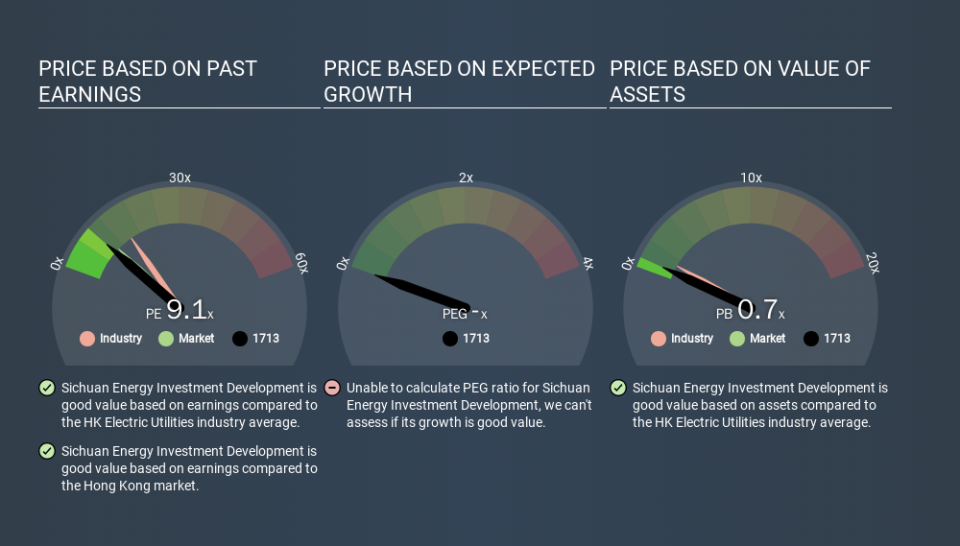Does Sichuan Energy Investment Development Co., Ltd.'s (HKG:1713) P/E Ratio Signal A Buying Opportunity?

This article is for investors who would like to improve their understanding of price to earnings ratios (P/E ratios). We'll apply a basic P/E ratio analysis to Sichuan Energy Investment Development Co., Ltd.'s (HKG:1713), to help you decide if the stock is worth further research. What is Sichuan Energy Investment Development's P/E ratio? Well, based on the last twelve months it is 9.11. That is equivalent to an earnings yield of about 11.0%.
View our latest analysis for Sichuan Energy Investment Development
How Do You Calculate A P/E Ratio?
The formula for price to earnings is:
Price to Earnings Ratio = Share Price (in reporting currency) ÷ Earnings per Share (EPS)
Or for Sichuan Energy Investment Development:
P/E of 9.11 = CNY1.69 (Note: this is the share price in the reporting currency, namely, CNY ) ÷ CNY0.19 (Based on the trailing twelve months to June 2019.)
Is A High Price-to-Earnings Ratio Good?
The higher the P/E ratio, the higher the price tag of a business, relative to its trailing earnings. That isn't necessarily good or bad, but a high P/E implies relatively high expectations of what a company can achieve in the future.
Does Sichuan Energy Investment Development Have A Relatively High Or Low P/E For Its Industry?
The P/E ratio essentially measures market expectations of a company. If you look at the image below, you can see Sichuan Energy Investment Development has a lower P/E than the average (15.2) in the electric utilities industry classification.
Its relatively low P/E ratio indicates that Sichuan Energy Investment Development shareholders think it will struggle to do as well as other companies in its industry classification. Many investors like to buy stocks when the market is pessimistic about their prospects. It is arguably worth checking if insiders are buying shares, because that might imply they believe the stock is undervalued.
How Growth Rates Impact P/E Ratios
Generally speaking the rate of earnings growth has a profound impact on a company's P/E multiple. If earnings are growing quickly, then the 'E' in the equation will increase faster than it would otherwise. That means even if the current P/E is high, it will reduce over time if the share price stays flat. Then, a lower P/E should attract more buyers, pushing the share price up.
Sichuan Energy Investment Development's earnings per share fell by 3.8% in the last twelve months. But over the longer term (5 years) earnings per share have increased by 8.7%.
Don't Forget: The P/E Does Not Account For Debt or Bank Deposits
The 'Price' in P/E reflects the market capitalization of the company. Thus, the metric does not reflect cash or debt held by the company. Theoretically, a business can improve its earnings (and produce a lower P/E in the future) by investing in growth. That means taking on debt (or spending its cash).
Such spending might be good or bad, overall, but the key point here is that you need to look at debt to understand the P/E ratio in context.
How Does Sichuan Energy Investment Development's Debt Impact Its P/E Ratio?
Since Sichuan Energy Investment Development holds net cash of CN¥104m, it can spend on growth, justifying a higher P/E ratio than otherwise.
The Verdict On Sichuan Energy Investment Development's P/E Ratio
Sichuan Energy Investment Development's P/E is 9.1 which is below average (10.4) in the HK market. Falling earnings per share are likely to be keeping potential buyers away, the healthy balance sheet means the company retains potential for future growth. If that occurs, the current low P/E could prove to be temporary.
Investors should be looking to buy stocks that the market is wrong about. As value investor Benjamin Graham famously said, 'In the short run, the market is a voting machine but in the long run, it is a weighing machine. We don't have analyst forecasts, but you could get a better understanding of its growth by checking out this more detailed historical graph of earnings, revenue and cash flow.
Of course you might be able to find a better stock than Sichuan Energy Investment Development. So you may wish to see this free collection of other companies that have grown earnings strongly.
If you spot an error that warrants correction, please contact the editor at editorial-team@simplywallst.com. This article by Simply Wall St is general in nature. It does not constitute a recommendation to buy or sell any stock, and does not take account of your objectives, or your financial situation. Simply Wall St has no position in the stocks mentioned.
We aim to bring you long-term focused research analysis driven by fundamental data. Note that our analysis may not factor in the latest price-sensitive company announcements or qualitative material. Thank you for reading.

